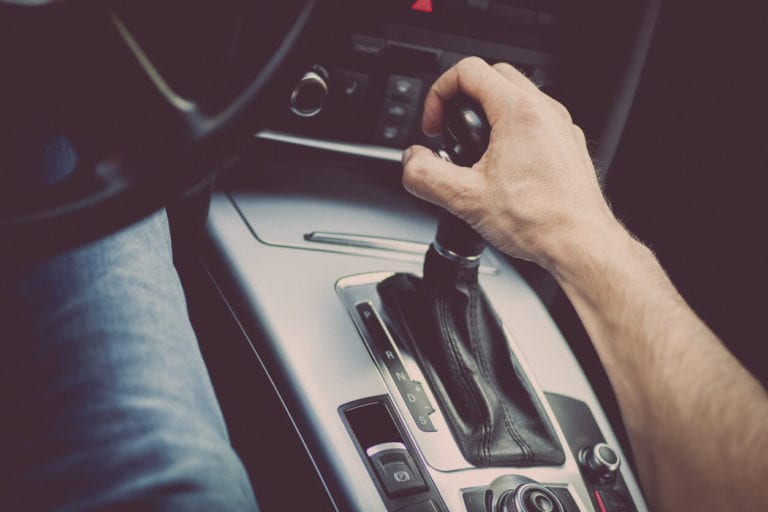Have A Info About Is It Safe To Drive A Jerking Car

Car Jerks When Shifting From Park To Drive Causes And Fixes Ran
Is Driving a Jerking Car Really a Good Idea? Let's Investigate.
1. Understanding the "Jerking" Phenomenon
Okay, let's talk about that unsettling feeling when your car starts acting like it's learning to drive a stick shift for the first time — even if it's an automatic. A jerking car is usually a sign that something isn't quite right under the hood. It's like your car is trying to tell you something, and ignoring it could lead to bigger, more expensive problems down the road. Imagine ignoring a cough until it turns into pneumonia; it's kind of like that, but with spark plugs and fuel injectors instead of lungs.
So, what causes this jerky behavior? Well, there's a whole laundry list of potential culprits. It could be anything from a simple issue like worn spark plugs (the little guys that ignite the fuel in your engine) to something more complex, like a faulty transmission or a vacuum leak. Each of these problems affects how smoothly your engine runs, and any hiccup can translate into that frustrating jerking sensation you're experiencing.
Think of your car's engine as a finely tuned orchestra. Every part has to play its role in perfect harmony to create a smooth, powerful sound. When one instrument is out of tune, the whole performance suffers. Similarly, when one component in your engine isn't working properly, it can cause the entire system to falter, resulting in those unsettling jerks and stutters.
Ignoring these symptoms is like ignoring a flashing warning light on your dashboard. It might seem tempting to pretend everything is fine and hope the problem goes away on its own, but trust me, that rarely happens. In fact, ignoring the issue could actually make it worse and lead to more significant damage to your vehicle. So, before you decide to hit the road, let's explore the potential dangers of driving a jerking car.

The Dangers Lurking Behind Those Jerks and Stutters
2. Safety Concerns
Now, let's get down to brass tacks: is it safe to drive a jerking car? The short answer is, probably not. While it might seem like a minor inconvenience at first, a jerking car can actually pose a significant safety risk to you, your passengers, and other drivers on the road. Imagine trying to merge onto a busy highway when your car suddenly decides to hesitate and jerk just as you're pulling into traffic. Not exactly a recipe for a stress-free commute, right?
One of the main concerns is the potential for reduced control. When your car is jerking and stuttering, it can be difficult to maintain a steady speed and direction. This is especially dangerous in situations that require precise maneuvering, such as navigating tight corners, changing lanes in heavy traffic, or reacting to sudden hazards. A sudden jerk could throw you off balance and cause you to lose control of the vehicle, potentially leading to an accident.
Another factor to consider is the unpredictable nature of the problem. The jerking might be intermittent at first, happening only occasionally, but it could quickly escalate into a more frequent and severe issue. You never know when the next jerk is going to occur, which can make driving extremely stressful and anxiety-inducing. It's like driving on eggshells, constantly waiting for the next shoe to drop (or, in this case, the next jerk to occur).
Furthermore, the underlying cause of the jerking could be a sign of a more serious mechanical problem. For example, a faulty transmission could eventually fail completely, leaving you stranded on the side of the road. Or, a vacuum leak could cause your engine to overheat, leading to permanent damage. By ignoring the jerking, you're essentially gambling with your safety and the well-being of your vehicle.

Common Culprits Behind the Jerking
3. Pinpointing the Problem
Alright, so we've established that driving a jerking car isn't ideal. But what exactly is causing all that ruckus under the hood? Let's take a look at some of the most common culprits, from the simple to the slightly more complicated. Think of this as a detective's guide to diagnosing your car's jerky behavior.
First up, we have the trusty spark plugs. These little guys are responsible for igniting the fuel in your engine, and if they're worn or fouled, they can cause misfires, which can lead to jerking. It's like trying to light a campfire with wet matches — you might get a spark here and there, but the fire won't burn consistently. Replacing your spark plugs is usually a relatively inexpensive and straightforward fix.
Next on the list is the fuel system. If your engine isn't getting enough fuel, it can cause it to stumble and jerk. This could be due to a clogged fuel filter, a faulty fuel pump, or dirty fuel injectors. Think of your fuel system as the circulatory system of your car; if there's a blockage in the arteries, the engine won't get the nourishment it needs to run smoothly. A good fuel system cleaning or replacement of the faulty component might be in order.
Finally, let's talk about the transmission. This is where things can get a bit more complex. A slipping transmission or faulty torque converter can cause your car to jerk and shudder, especially during gear changes. This is a more serious issue that may require professional attention. Ignoring transmission problems can lead to major damage and costly repairs down the road, so it's best to get it checked out as soon as possible.
Other potential causes of a jerking car include vacuum leaks, faulty sensors (such as the mass airflow sensor or oxygen sensor), and even problems with the engine's computer. The key is to get your car diagnosed by a qualified mechanic who can accurately pinpoint the source of the problem and recommend the appropriate repairs.

Causes And Fixes For A Car Jerking When Stopped In Drive?
What To Do When Your Car Starts Jerking
4. Taking Action
Okay, so your car is jerking. Don't panic! Here's a step-by-step guide on what to do next to get your car back on the road safely and smoothly. First, pay attention to when the jerking occurs. Does it happen when you're accelerating, decelerating, or idling? Is it worse when the engine is cold or warm? The more information you can gather, the better equipped your mechanic will be to diagnose the problem.
Next, resist the urge to keep driving the car excessively. The more you drive it, the more damage you could potentially be causing. Instead, schedule an appointment with a trusted mechanic as soon as possible. Look for a mechanic who has experience with the make and model of your car and who has a good reputation for diagnosing and repairing engine problems. A reputable shop will use diagnostic tools to pinpoint the exact issue before recommending any repairs.
While you're waiting for your appointment, you can do some basic checks yourself. Check your car's fluid levels, including the engine oil, coolant, and transmission fluid. Low fluid levels can sometimes contribute to jerking and other engine problems. Also, visually inspect the engine compartment for any obvious signs of damage, such as loose wires, cracked hoses, or fluid leaks.
Once you've taken your car to the mechanic, be sure to communicate clearly about the symptoms you've been experiencing. The more information you can provide, the easier it will be for the mechanic to diagnose the problem accurately. Ask questions about the diagnosis and the proposed repairs, and don't hesitate to get a second opinion if you're not comfortable with the initial assessment. Once the repairs are completed, test drive your car to ensure that the jerking has been resolved and that it's running smoothly again.

Preventing Future Jerks
5. Maintenance Matters
The best way to avoid the headache of a jerking car is to practice preventative maintenance. Just like going to the doctor for regular checkups, your car needs regular maintenance to stay in tip-top shape. This includes following the manufacturer's recommended service schedule for oil changes, filter replacements, and other routine maintenance tasks. Think of it as giving your car a little TLC to keep it happy and healthy. After all, a well-maintained car is a happy car (and a happy driver!).
One of the most important things you can do is to keep your car's fluids topped off and in good condition. This includes the engine oil, coolant, transmission fluid, brake fluid, and power steering fluid. Low or dirty fluids can cause all sorts of problems, including jerking, overheating, and premature wear and tear on engine components. Check your fluid levels regularly and have them changed according to the manufacturer's recommendations.
Another key to preventing future jerks is to pay attention to your car's warning lights. If a warning light comes on, don't ignore it! It's usually a sign that something is amiss and needs to be addressed. Consult your owner's manual to understand what the warning light means and take your car to a mechanic for diagnosis and repair as soon as possible. Ignoring a warning light could lead to more serious damage and costly repairs down the road.
Finally, consider your driving habits. Aggressive driving, such as excessive acceleration and braking, can put a strain on your car's engine and transmission, which can increase the risk of jerking and other problems. Drive smoothly and avoid sudden changes in speed. Not only will this help prevent future jerks, but it will also improve your fuel economy and extend the life of your car's components.

Car Jerking When Put In Drive
FAQ
6. Your Questions Answered
Still have some questions swirling around in your head about your car's jerky behavior? No problem! Let's tackle some frequently asked questions to help clear up any lingering doubts.
Q: Can a jerking car cause further damage if I keep driving it?A: Absolutely. Think of it like ignoring a sprained ankle; you might be able to hobble around for a while, but you're likely making the injury worse. Driving a car that's jerking can exacerbate the underlying problem, leading to more significant and expensive repairs down the line. Best to get it checked out sooner rather than later.
Q: Is it safe to drive a jerking car on the highway?A: It's generally not recommended. Highway driving requires consistent speed and smooth acceleration, which can be difficult to maintain with a jerking car. The unpredictable nature of the jerking could also increase the risk of an accident, especially when merging or changing lanes.
Q: How much will it cost to fix a jerking car?A: That's a tricky question, as the cost can vary depending on the cause of the jerking. Simple fixes like replacing spark plugs or cleaning fuel injectors might only cost a few hundred dollars, while more complex repairs like transmission work could run into the thousands. Getting a proper diagnosis from a qualified mechanic is the best way to get an accurate estimate.